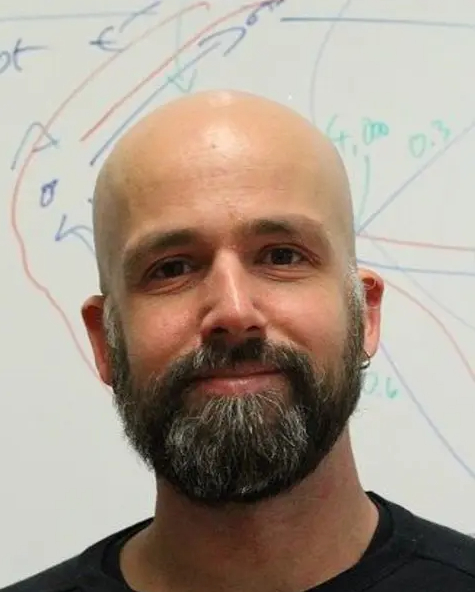Conférenciers invités
Conférencié invité IC du 03/07

Pascal Hitzler
Kansas State UniversityJournées francophones d'Ingénierie des Connaissances ([IC]) Lundi 3 juillet
Titre : Knowledge graphs in neurosymbolic learning approaches [Présentation]
Résumé :
Symbolic AI (based on knowledge representation and formal logic) and AI based on artificial neural networks (such as deep learning) are fundamentally different approaches to artificial intelligence with complementary capabilities. The former are transparent and data-efficient, but they are sensitive to noise and cannot be applied to non-symbolic domains where the data is ambiguous. The latter can learn complex tasks from examples, are robust to noise, but are black boxes; require large amounts of - not necessarily easily obtained - data, and are slow to learn and prone to adversarial examples. Either paradigm excels at certain types of problems where the other paradigm performs poorly. In order to develop stronger AI systems, integrated neurosymbolic systems that combine artificial neural networks and symbolic reasoning are being sought. In this talk, we discuss recent results regarding our work on using using symbolic logical reasoning in the form of concept induction over knowledge graphs for explaining deep learning systems.
Biographie :
Pascal Hitzler is Professor and endowed Lloyd T. Smith Creativity in Engineering Chair and Director of the Center for Artificial Intelligence and Data Science (CAIDS) at the Department of Computer Science at Kansas State University. Until July 2019 he was endowed NCR Distinguished Professor, Brage Golding Distinguished Professor of Research, and Director of Data Science at the Department of Computer Science and Engineering at Wright State University in Dayton, Ohio, U.S.A. He is director of the Data Semantics (DaSe) Lab. From 2004 to 2009, he was Akademischer Rat at the Institute for Applied Informatics and Formal Description Methods (AIFB) at the University of Karlsruhe in Germany, and from 2001 to 2004 he was postdoctoral researcher at the Artificial Intelligence institute at TU Dresden in Germany. In 2001 he obtained a PhD in Mathematics from the National University of Ireland, University College Cork, and in 1998 a Diplom (Master equivalent) in Mathematics from the University of Tübingen in Germany. His research record lists over 400 publications in such diverse areas as semantic web, artificial intelligence, neural-symbolic integration, knowledge representation and reasoning, machine learning, denotational semantics, and set-theoretic topology. His research is highly cited. He is founding Editor-in-chief of the Semantic Web journal, the leading journal in the field, of the new Neurosymbolic Artificial Intelligence journal, and of the IOS Press book series Studies on the Semantic Web. He is co-author of the W3C Recommendation OWL 2 Primer, and of the book Foundations of Semantic Web Technologies by CRC Press, 2010, which was named as one out of seven Outstanding Academic Titles 2010 in Information and Computer Science by the American Library Association's Choice Magazine, and has translations into German and Chinese. He is on the editorial board of several journals and book series and a founding steering committee member of the Neural-Symbolic Learning and Reasoning Association and the Association for Ontology Design and Patterns, and he frequently acts as conference chair in various functions. For more information about him, see http://www.pascal-hitzler.de.
Conférencié invité IC/PFIA du 04/07

Heiko Paulheim
University of Mannheim, AllemagneJournées francophones d'Ingénierie des Connaissances ([IC]) Mardi 4 juillet
Titre : New Adventures in RDF2vec [Présentation]
Résumé :
Knowledge graphs are large-scale collections of knowledge of one or more domains, which can be consumed both by humans and computers. For exploiting knowledge graphs in systems using machine learning, they typically need to be transformed to a propositional, i.e., vector-shaped representation of entities. RDF2vec is an example for generating such vectors from knowledge graphs, relying on random walks for extracting pseudo-sentences from a graph, and utilizing word2vec for creating embedding vectors from those pseudo-sentences. In this talk, I will give insights into the idea of RDF2vec, possible application areas, and recently developed variants incorporating different walk strategies and training variations. Moreover, I will step away from purely quantitative evaluations and take a deeper look at what knowledge graph embedding methods like RDF2vec are generally capable of learning.
Biographie :Heiko Paulheim is a full professor for data science at the University of Mannheim. He holds a PhD from the Technical University of Darmstadt and has conducted research at the University of Applied Sciences of Darmstadt, SAP Research, and the Technical University of Darmstadt prior to this position. His group conducts various projects around knowledge graphs, yielding, among others, the public knowledge graphs WebIsALOD, CaLiGraph, and DBkWik. Moreover, his group is concerned with using knowledge graphs in machine learning, which has lead to the development of the widespread RDF2vec method for knowledge graph embeddings. In the recent past, Heiko Paulheim also leads projects which are concerned with ethical, societal, and legal aspects of AI, including KareKoKI, which deals with the impact of price-setting AIs on antitrust legislation, and the ReNewRS project on ethical news recommenders.